Related Research Articles

Indonesia, officially the Republic of Indonesia, is a country in Southeast Asia and Oceania between the Indian and Pacific oceans. It consists of over 17,000 islands, including Sumatra, Java, Sulawesi, and parts of Borneo and New Guinea. Indonesia is the world's largest island country and the 14th-largest country by area, at 1,904,569 square kilometres. With over 279 million people, Indonesia is the world's fourth-most populous country and the most populous Muslim-majority country. Java, the world's most populous island, is home to more than half of the country's population.

North Sulawesi is a province of Indonesia. It is located on the Minahasa Peninsula of the island of Sulawesi, south of the Philippines and southeast of Sabah, Malaysia. It borders the Philippine province of Davao Occidental and Soccsksargen regions of the Philippines to the north, the Maluku Sea to the east, Gorontalo and Celebes Sea to the west and the Gulf of Tomini to the southwest. With the outlying island of Miangas to its north, it is the northernmost island of Indonesia. The province's area is 14,500.28 square kilometres (5,598.59 sq mi), and its population was 2,270,596 according to the 2010 census; this rose to 2,621,923 at the 2020 Census, while the official estimate as at mid 2022 was 2,659,543. North Sulawesi is known as a heaven for divers around the world.

The Minahasans or Minahassa are an indigenous ethnic group from the North Sulawesi province of Indonesia, formerly known as North Celebes. The Minahasa people sometimes refer to themselves as Manado people. Although the Minahasan pre-Christian creation myth entails some form of ethnic unification, before the nineteenth century the Minahasa region was in no way unified. Instead, a number of politically independent groups (walak) existed together, often in a permanent state of conflict.
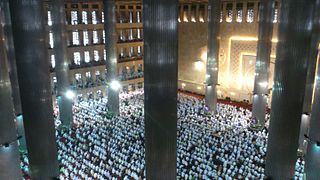
Islam is the largest religion in Indonesia, with 87% of the Indonesian population identifying themselves as Muslims, based on civil registry data in 2022. In terms of denomination, the overwhelming majority are Sunni Muslims; the Pew Research Center estimates them as comprising ~99% of the country's Muslim population in 2011, with the remaining 1% being Shia who are concentrated around Jakarta and about 400,000 Ahmadi Muslims as well. Indonesia is the most populous Muslim-majority country.

Taman Mini Indonesia Indah is a culture-based recreational area located in East Jakarta, Indonesia. Since July 2021, it is operated by PT Taman Wisata Candi Borobudur, Prambanan, dan Ratu Boko, a subsidiary of the state-owned tourism holding company Injourney. It was operated by Yayasan Harapan Kita, a foundation established by Siti Hartinah, the first lady during most of the New Order and wife of Suharto, and run by Suharto's descendants since his death until 2021. It has an area of about 100 hectares. The project cost some US$ 26 million.
In Indonesia, village or subdistrict is the fourth-level subdivision and the smallest administrative division of Indonesia below a district, regency/city, and province. Similar administrative divisions outside of Indonesia include barangays in the Philippines, Muban in Thailand, civil townships and incorporated municipalities in the United States and Canada, communes in France and Vietnam, dehestan in Iran, hromada in Ukraine, Gemeinden in Germany, comuni in Italy, or municipios in Spain. The UK equivalent are civil parishes in England and communities in Wales. There are a number of names and types for villages in Indonesia, with desa being the most frequently used for regencies, and kelurahan for cities or for those communities within regencies which have town characteristics. According to the 2019 report by the Ministry of Home Affairs, there are 8,488 urban villages and 74,953 rural villages in Indonesia. North Aceh Regency contained the highest number of rural villages (852) amongst all of the regencies of Indonesia, followed by Pidie Regency with 730 rural villages and Bireuen Regency with 609 rural villages. Prabumulih, with only 12 rural villages, contained the fewest. Counted together, the sixteen regencies of Indonesia containing the most rural villages—namely, North Aceh (852), Pidie (730), Bireuen (609), Aceh Besar (604), Tolikara (541), East Aceh (513), Yahukimo (510), Purworejo (469), Lamongan (462), South Nias (459), Kebumen (449), Garut (421), Bojonegoro (419), Bogor (416), Cirebon (412), and Pati (401)—contain one-third of all the rural villages in Indonesia. Five of these are located in Aceh, two in Highland Papua, three in Central Java, two in East Java, three in West Java, and one in North Sumatra. An average number of rural villages in the regencies and 15 cities of Indonesia is 172 villages. A village is the lowest administrative division in Indonesia, and it is the lowest of the four levels. A village is usually divided into a number of hamlets, and there are 252,315 hamlets in Indonesia.
Indigenous people under the nation-state have experienced exclusion and dispossession. With the rise in globalization, material advantages for indigenous populations have diminished. At times, national governments have negotiated natural resources without taking into account whether or not these resources exist on indigenous lands. In this sense for many indigenous populations, the effects of globalization mirror the effects of the conquest in the mid 16th century.
Aman may refer to:
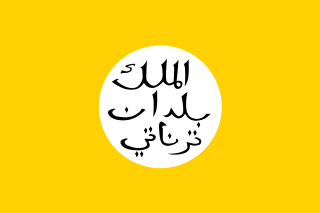
The Sultanate of Ternate, previously also known as the Kingdom of Gapi is one of the oldest Muslim kingdoms in Indonesia besides the sultanates of Tidore, Jailolo, and Bacan.
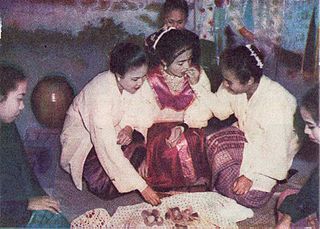
Moluccans are the Austronesian-speaking and Papuan-speaking ethnic groups indigenous to the Maluku Islands, Eastern Indonesia. The region was historically known as the Spice Islands, and today consists of two Indonesian provinces of Maluku and North Maluku. As such, "Moluccans" is used as a blanket term for the various ethnic and linguistic groups native to the islands.
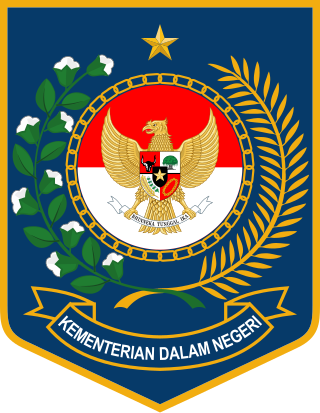
The Ministry of Home Affairs is an interior ministry of the government of Indonesia responsible for matters of the state. The ministry was formerly known as the Department of Home Affairs until 2010 when the nomenclature of the Department of Home Affairs was changed to the Ministry of Home Affairs in accordance with the Regulation of the Minister of Home Affairs Number 3 of 2010 on the Nomenclature of the Ministry of Home Affairs.
Ternate is a language of northern Maluku, eastern Indonesia. It is spoken by the Ternate people, who inhabit the island of Ternate, as well as many other areas of the archipelago. It is the dominant indigenous language of North Maluku, historically important as a regional lingua franca. A North Halmahera language, it is unlike most languages of Indonesia which belong to the Austronesian language family.
Mina Susana Setra is an indigenous, environmental and land rights activist from Borneo. She serves as an activist for the Indigenous People's Alliance of the Archipelago and was instrumental in securing a ruling from the Constitutional Court recognizing customary land rights of indigenous people.

Gorontalo is a province of Indonesia on the island of Sulawesi. Located on the Minahasa Peninsula, Gorontalo was formerly part of the province of North Sulawesi until its inauguration as a separate province on 5 December 2000. The province is bordered by the provinces of North Sulawesi to the east and Central Sulawesi to the west, as well sharing a maritime border with the Philippines to the north. The provincial capital, as well as the main gateway to the province and its most populated city, is Gorontalo .The size is comparable to Vanuatu.
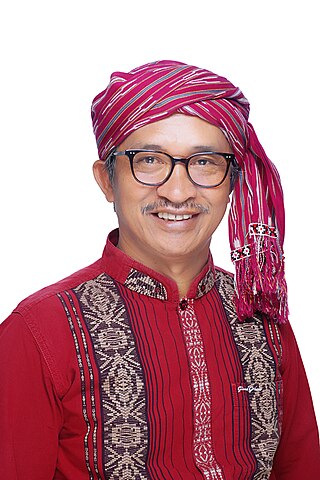
Nababan Abdon is the recipient of the 2017 Ramon Magsaysay Award and it was awarded for his courage and advocacy that have become the voice and face for the Indigenous Peoples Alliance in Indonesia.

Wawasan Nusantara or Indonesian Archipelagic Vision is the national vision of Indonesia towards their people, nation, and territory of the unitary state of the Republic of Indonesia; which includes its land, sea, also the air and space above it, as a unity of political, economic, social, cultural, defense and security entity. This national insight subsequently becomes the perspective or vision of the nation towards its national goals and ideals.
Batamad, abbreviation from Barisan Pertahanan Masyarakat Adat Dayak, is an official paramilitary under National Dayak Customary Council in Indonesia. It was established in February 2012 with approval of Central Kalimantan provincial government based on Regional Law Number 16 of 2008. Initially, it was created as a response of rising religious extremism in Indonesia, including Central Kalimantan, and the paramilitary was tasked to supervise suspicious religious activities there, particularly those allegedly by Islamic extremism. Other than that, the organization is also tasked to enforce customary laws under Dayak culture, enforcing tribal land claims, as well as protecting rights of Dayak people. It is proposed in 2018 by Central Kalimantan province that the organization would also act as a security personnels during tribal courts. However, outside of its given legal authorities, the organization also participate in enforcing road traffic with Indonesian National Police. The organization has been descibred by local media as an "official tribal police".

Nusantara Capital City Authority is a cabinet level-agency formed by Indonesian government, working directly under the President of Indonesia. The agency will become a special agency tasked with managing and governing the city of Nusantara, future capital of Indonesia located on Kalimantan.
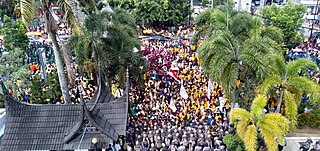
The 2022 Indonesian student protests, also known as the 11 April demonstrations, were a series of protests led mostly by students throughout Indonesia. They were triggered by rumours regarding a delay of the 2024 election and proposals of amending the Constitution to allow President Joko Widodo to have a third term. They drew attention to food prices and the rising price of cooking oil in Indonesia. They were conducted mostly by university and college students in major cities across the country, and much of the organizing was done by the All-Indonesia Students Executive Alliance (BEM-SI).
References
- ↑ "Aliansi Masyarakat Adat Nusantara – Berdaulat, Mandiri, Bermartabat". www.aman.or.id. Retrieved 2016-07-18.
- ↑ Bartley, Tim (2011). "Transnational Governance as the Layering of Rules". Theoretical Inquiries in Law.
- ↑ Johnstone, Naomi (2010). "Indonesia in the 'REDD':Climate Change, Indigenous Peoples and Global Legal Pluralism" (PDF). Asian-Pacific Law & Policy Journal.[ permanent dead link ]
- ↑ "Aliansi Masyarakat Adat Nusantara - If Not Us Then Who?" . Retrieved 2016-07-18.
- ↑ "Emerging Indigenous Peoples Movement in Indonesia | ヒューライツ大阪". www.hurights.or.jp. Retrieved 2016-07-18.
- ↑ "Emerging Indigenous Peoples Movement in Indonesia | ヒューライツ大阪". www.hurights.or.jp. Retrieved 2016-07-18.
- ↑ "Pidato Sekretaris Jendral Aliansi Masyarakat Adat Nusantara (Sekjen AMAN) menyambut Hari Kebangkitan Masyarakat Adat Nusantara (HKMAN) 2015 dan 16 Tahun AMAN – Aliansi Masyarakat Adat Nusantara". www.aman.or.id. Archived from the original on 2016-08-18. Retrieved 2016-07-18.
- ↑ "For the Indigenous Communities, Maps are the Answer" . Retrieved 2016-07-18.